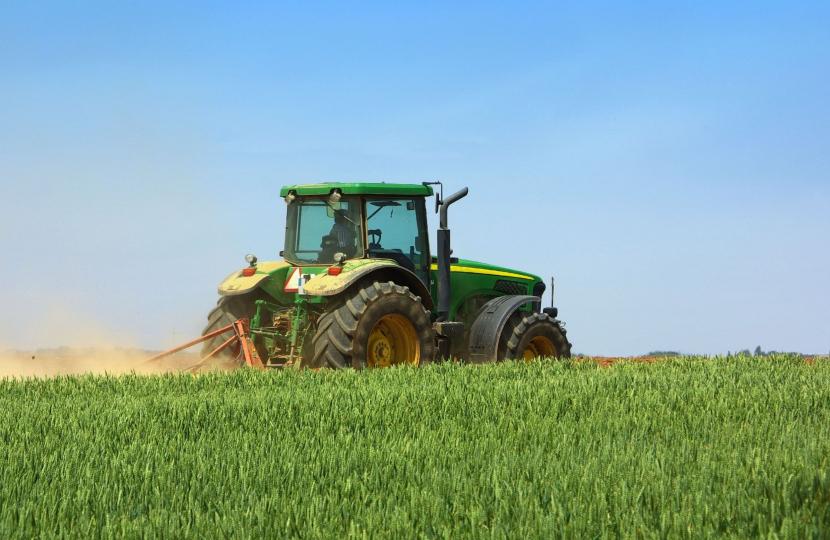
I have received a large amount of correspondence from a number of constituents who are understandably concerned with the future of farming.
My ministerial colleagues and I appreciate that these are turbulent times. The spike in oil and gas prices as the world emerged from the pandemic has been exacerbated by the appalling conflict in Ukraine. This is inevitably leading to sharp rises in input costs such as diesel, fertiliser, and feed as well as causing agriculture commodity prices to rise.
I know that Ministers want to ensure farmers have the options to help them through the current turbulence. In March, the Government announced that it would delay the introduction of changes to the use of urea fertiliser and has also issued statutory guidance to the Environment Agency so that autumn spreading of slurry and other farm yard manures will be permitted under the Farming Rules for Water.
Last year, the Department for Environment, Food and Rural Affairs (Defra) opened a call for grant application for a new Farming Equipment and Technology Fund. It was highly over-subscribed so the budget was trebled from £17 million to over £48 million, enabling Ministers to assist over 4,000 farmers with their investment plans.
In October 2021, Defra launched the Farming Innovation Programme with an initial £17.5m to enable more farmers and growers to get involved in agricultural and horticultural R&D. This will support and drive adoption of new innovation by farmers and growers to ensure it can make a real difference. I know that the Government recently announced a further £20.5 million of these R&D grants.
I have outlined further information in line with a number of farming policy areas below:
Environmental Land Management Schemes
Now that the UK is not in the European Union, the UK is free from the Common Agricultural Policy, which did little to deliver for farmers, farming or the environment. The Government is committed to maintaining the budget for farming but spending it in a way that does better for farming and nature. Ministers are rolling out new schemes that will support farmers to both produce high quality food and enhance the natural environment. I look forward to reading more about these schemes as further details are announced.
Animal Health and Welfare Pathway
The Annual Health and Welfare Review will be launched in the autumn, which is the first step of the Animal Health and Welfare Pathway. This will fund vet visits to undertake a health and welfare review for farms across England. The Pathway will push forward and support the gradual and continual improvement in farm animal health and welfare. Through the Pathway, the Government will work on each step with farmers, vets, the wider industry and the supply chain.
In 2023, Ministers will introduce Animal Health and Welfare Grants, followed by Endemic Disease Eradication and Control Programmes and a Payment-by-Results trial. Beyond this financial assistance, the Pathway also aims to stimulate market demand for higher welfare products by increasing transparency and strengthening the regulatory baseline.
Food Strategy
The Government’s Food Strategy sets out the importance of maintaining and boosting our food security. It commits to broadly maintaining the current level of food we produce domestically and increasing production in sectors where there are the biggest opportunities, such as horticulture and seafood. I understand that £270 million will be invested across farming innovation funding programmes until 2029, to unlock technologies to drive sustainable farming techniques which will help increase productivity and profitability and the sector’s long-term resilience.
BPS Subsidy Payments 2022
Manufactured ammonium nitrate depends on large quantities of gas and when the gas price spikes, as well as fertiliser costs and other input costs such as tractor diesel and electricity. This means that farmers have had an increased risk on their profit and loss account, and Ministers recognise the increased pressure on cash flow.
I am aware that Defra decided to bring forward 50 per cent of this year’s BPS payment as an advance injection of cash to farm businesses from the end of July to provide some confidence. The balance will be paid in the legacy payment window from December. Further, Ministers intend to make this a permanent change to the way BPS is paid in future, with twice yearly instalments going forward.
Food Strategy
The Government’s Food Strategy sets out the importance of maintaining and boosting our food security. It commits to broadly maintaining the current level of food we produce domestically and increasing production in sectors where there are the biggest opportunities, such as horticulture and seafood. I understand that £270 million will be invested across farming innovation funding programmes until 2029, to unlock technologies to drive sustainable farming techniques which will help increase productivity and profitability and the sector’s long-term resilience.
